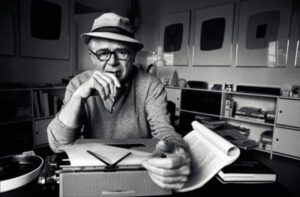
In celebration of Polish American Heritage Month, we recognize the economic, cultural, political, and social contributions of notable immigrants and refugees who helped shape America’s vibrant tapestry. Today, we spotlight prolific writer and director, Billy Wilder.
Billy Wilder was born Samuel Wilder on June 22, 1906, in Sucha, a small town in Galicia, Austria-Hungary (present-day Poland). An exuberant child, he found inspiration from Buffalo Bill’s Wild West shows, which he viewed during family visits to New York, and served as inspiration for his professional name change. He studied prelaw for one year at the University of Vienna before dropping out to work as a sports reporter for a local newspaper.
In 1926, he began covering crime. This helped him develop his burgeoning screenwriting chops, which he put to use when he earned his first credit working on Siodmak’s Menschen am Sonntag in 1930. The breakthrough led to a handful of scripts for both German and French films. But when the Nazis took power in 1933, Wilder fled to Paris. There, he directed Mauvaise Graine, then made a brief stop in Mexico before immigrating to California, United States.
Speaking limited English during his early days in Hollywood, Wilder collaborated with writers who could translate his work. He stacked a series of credits in under-the-radar scripts, including Music in the Air and Lottery Lover. In 1937, Paramount tapped him to write a series of romantic-comedy hits with Charles Brackett. The prolific writing duo quickly became the best-known and most respected team in Hollywood.
Over the next 12 years, they produced a string of box-office hits. The success gave Wilder his first opportunity to direct a film in the U.S. — the now-classic comedy, The Major and the Minor.
In the 1950s, Wilder teamed with producer I.A.L. Diamond. The two collaborated for two decades and produced major box-office hits, including 1954’s Witness for the Prosecution and 1959’s Some Like It Hot.
Wilder was widely recognized as one of the most successful figures in the business; his vision and skills spanned multiple genres. He was equally adept at mastering light-hearted comedy as at showcasing film noir, court dramas, or penetrating the superficialities of modern life. Though he often took on criticism for his depiction of taboo topics such as prostitution and alcoholism, the quality and depth of his work gave way to both public and industry praise. The talent he directed ranged from luminaries such as Marilyn Monroe and Marlene Dietrich to Jimmy Stewart and Shirley MacLaine.
Wilder took home six Academy Awards and was nominated for another fifteen. Seven of his films are preserved in the United States National Film Registry of the Library of Congress as being “Culturally, historically, or aesthetically significant”. Billy Wilder passed in 2002 following a bout with pneumonia.
Others we are celebrating in honor of Polish American Heritage Month:
2025
Henryk Arctowski, world-renowned Polish American scientist
Dr. Israel Rabi, Nobel Prize-winning scientist
Marcella Sembrich, trailblazing soprano singer and educator

